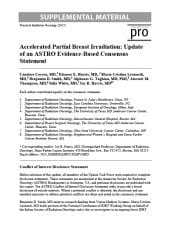Authors
Candace Correa, MD, Eleanor E. Harris, MD, Maria Cristina Leonardi, MD, Benjamin D. Smith, MD, Alphonse G. Taghian, MD, PhD, Alastair M. Thompson, MD, Julia White, MD, Jay R. Harris, MD
Purpose
This manuscript provides the results of applying this process to update the ASTRO APBI consensus statement, with a focus on selection criteria for APBI and IORT for PBI outside of a clinical trial. This update is endorsed by the Society of Surgical Oncology.
Methods
In April 2014, a work group was formed to review the available evidence and recommend whether the APBI Consensus Statement should be updated. The work group included three coauthors of the original Consensus Statement (BDS, JW, JRH), a breast cancer expert not involved in the initial Consensus Statement (AGT), and three members of the ASTRO guidelines subcommittee (EH, CC, BDS). After a review of the literature, the work group recommended a partial update of the Consensus Statement including: (1) Revising the inclusion criteria of the “suitable” and “cautionary” patient groups, with regard to age, margins, and pure DCIS; and (2) Creating a new key question regarding the use IORT for PBI in early-stage breast cancer outside of a clinical trial. Other aspects of the prior guideline were felt to still be current and thus not in need of updating. The work group also proposed adding two IORT experts; a surgeon (AMT- TARGIT) and a radiation oncologist (MCL- ELIOT). In January 2015, the ASTRO Board of Directors approved the proposal to partially update the Consensus Statement.
Results
Young age is a consistently documented risk factor for ipsilateral breast cancer tumor recurrence (IBTR) following WBI post-lumpectomy. The choice in the original Consensus Statement of age 60 as the lower limit to be “suitable” was influenced by three main factors: 1) The median age of women treated with APBI in available prospective data was >60 years;1 2) The 2005 Early Breast Cancer Trialists’ Collaborative Group (EBCTCG) meta-analysis supported that women >60 years had lower IBTR risk and less survival benefit from postlumpectomy radiotherapy; and 3) Most existing APBI clinical experience had < 5 years followup, raising concerns that this underestimated the event rate, particularly in younger women.
Conclusions
APBI has been tested in a limited number of trials with over 1000 patients over the last 10 years. These trials show that in properly selected breast cancer patients, APBI has provided outcomes similar to WBI. In the light of the new literature, the suitability criteria for APBI have now been updated, as summarized in Tables 1-3. Table 4 provides the overall summary of the new recommendations, including the level of agreement amongst the writing panel and the strength of the evidence and recommendations. It is hoped that this update will provide ongoing direction for radiation oncologists and other specialists participating in the care of breast cancer patients.
